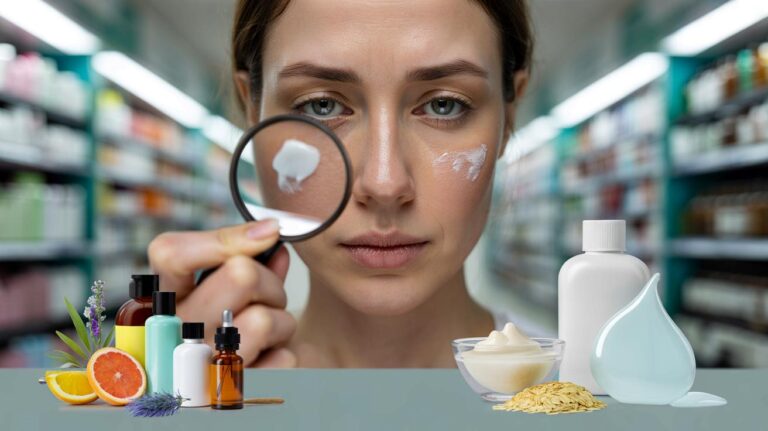Essential Care Tips for Sensitive Skin
Sensitive skin presents daily challenges. A single wrong product can cause irritation, turning your face into a warning sign. While labels boast of their calming effects, the hidden irritants often tell a different story.
Recently, I observed a woman in a local pharmacy scrutinizing a moisturizer under bright lights, visibly distressed. Her cheeks glowed red—a classic sign of irritation. It’s a common tale; what works for one person can lead to discomfort for another, leaving many reeling from trial and error.
Identifying Hidden Skin Irritants
Fragrance and essential oils are often silent culprits behind skin reactions. Although “parfum” appears harmless on ingredient lists, allergens like linalool and limonene are frequently overlooked. A real-world example: Emma, 32, switched to a “fresh citrus” gel cleanser for the gym. What started as a tingling sensation quickly escalated to discomfort, ultimately leading to peeling skin. Research indicates that more than half the population identifies as having sensitive skin, with fragrance frequently cited as a top trigger.
Moreover, it isn’t just individual ingredients causing issues. Sensitive skin can revolt when exposed to an accumulation of harsh elements—such as denatured alcohol, strong foaming agents, or potent acids—over an extended period. Maintaining a stable pH (4.5-5.5) and using recognizable ingredients like ceramides and fatty acids is crucial to preserving your skin’s barrier and preventing flare-ups.
Crafting a Gentle Skincare Routine
Building a soothing skincare routine can be simplified into four essential steps: cleanse, treat, moisturize, and protect. Opt for non-foaming or mild cleansers featuring glucosides and maintain a limited active ingredient window. When introducing new products, a methodical patch test is advisable: try three days on the inner arm, followed by three days behind the ear, and then three nights on your face. Start with low concentrations of niacinamide (2–5%) and azelaic acid (5–10%) to gauge tolerance. For daily protection, choose mineral sunscreens like zinc oxide or titanium dioxide.
Common mistakes include over-exfoliating, mixing too many potent ingredients, or overwhelming your skin with various trends. Combining retinoids, acids, and essential oils without breaks can heighten sensitivity. It’s essential to listen to your skin. If irritation occurs, take a step back and incorporate barrier-supporting ingredients like ceramides and squalane.
Recognizing the Dynamic Nature of Sensitivity
Sensitivity is not static; it fluctuates with seasons, hormonal changes, and stress levels. A cleanser that works well in warmer months may cause irritation in the winter months, when heating systems dry out the skin. A wise approach is to shift your perspective from “finding the perfect product” to “recognizing skin patterns.” Stick with a standard moisturizer while adjusting actives based on environmental factors. On days when your skin feels reactive, prioritize hydration and ceramides for a soothing effect.
Less is often more when it comes to skincare. Reducing the number of fragrances, foams, and ambitious claims can create a more harmonious environment for your skin. Your ideal skincare routine may appear unexciting at first glance, but it will ultimately deliver the relief your skin craves.
Key Takeaways for Sensitive Skin Care
- Avoid hidden fragrances: Look out for “parfum” and allergen lists containing linalool and limonene to minimize irritation.
- Opt for gentle cleansers: Choose sulfate-free alternatives like glucosides or cream cleansers to support your skin’s barrier.
- Start with low concentrations of active ingredients: Begin with niacinamide (2–5%) and azelaic acid (5–10%) for effective results without triggering sensitivity.
Frequently Asked Questions
Can I use retinoids if my skin is sensitive?
Yes, start slow with encapsulated retinol or retinal once a week, buffering with moisturizer, and gradually increase as tolerance permits.Is all alcohol harmful in skincare?
Fatty alcohols (like cetyl and cetearyl) are safe; however, high concentrations of denatured alcohol may cause drying and irritation, especially in toners.How should I patch test a new product?
Apply a small amount to your inner arm for three nights, followed by a test behind your ear for three nights. If well-tolerated, use it on your face every third night for a week.Why do some chemical sunscreens irritate my eyes?
Certain filters may cause irritation; opt for mineral sunscreens like zinc oxide or titanium dioxide around the eye area and allow the sunscreen to set before applying makeup.Which single ingredient should I introduce first?
Ceramides are beneficial as they help restore barrier function and work well with soothing ingredients, such as glycerin and panthenol.
